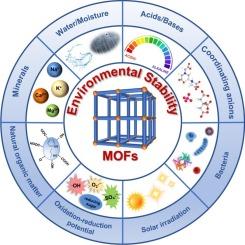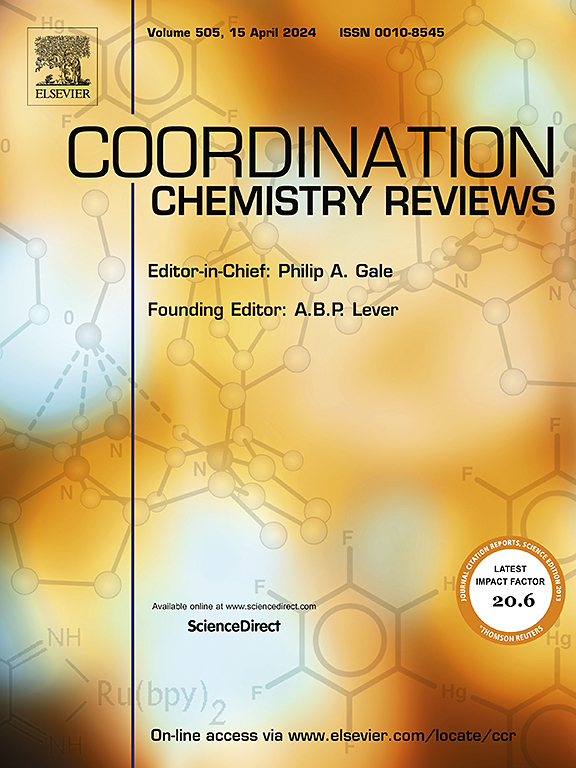Are MOFs ready for environmental applications: Assessing stability against natural stressors?
IF 20.3
1区 化学
Q1 CHEMISTRY, INORGANIC & NUCLEAR
引用次数: 0
Abstract
Metal-organic frameworks (MOFs), as emerging porous crystalline materials comprising metal ions/clusters and organic linkers, display significant potential for applications in adsorption, separation, catalysis, and other environmental domains, owing to their intrinsic structural diversity. However, the stability of MOFs under various environmental conditions remains a critical challenge, potentially hindering their broader practical adoption. Hence, a thorough understanding of the effects of environmental factors on MOF stability is imperative. This review explores the impact of essential environmental parameters—including liquid water/moisture, acids/bases, coordinating anions, solar irradiation, bacteria, oxidation-reduction potential, natural organic matter, and minerals—on the structural integrity of MOFs. The underlying mechanisms by which these factors affect MOF stability are elucidated, and MOFs are classified according to their resilience or susceptibility under specific environmental conditions. Furthermore, illustrative case studies of both robust and vulnerable MOFs are discussed to highlight the principles guiding the selection of MOFs for diverse practical applications. The challenges and future direction in this field are also proposed. Overall, this review aims to serve as a critical resource, facilitating the effective transition of MOFs from laboratory settings to real implementations, thereby enhancing their practical utility and effectiveness in addressing challenges of environmental pollution control and energy-related issues.


mof为环境应用做好准备了吗:评估抗自然压力的稳定性?
金属有机骨架(mof)作为一种由金属离子/簇和有机连接剂组成的新兴多孔晶体材料,由于其固有的结构多样性,在吸附、分离、催化和其他环境领域显示出巨大的应用潜力。然而,mof在各种环境条件下的稳定性仍然是一个关键挑战,可能会阻碍其更广泛的实际应用。因此,深入了解环境因素对MOF稳定性的影响是必要的。本文综述了包括液态水/湿度、酸/碱、配位阴离子、太阳辐照、细菌、氧化还原电位、天然有机质和矿物在内的基本环境参数对mof结构完整性的影响。阐明了这些因素影响MOF稳定性的潜在机制,并根据MOF在特定环境条件下的弹性或易感性进行了分类。此外,还讨论了鲁棒和脆弱mof的示例研究,以突出指导mof在各种实际应用中的选择原则。提出了该领域面临的挑战和未来的发展方向。总的来说,本综述旨在作为一个关键资源,促进MOFs从实验室环境到实际应用的有效过渡,从而提高其在解决环境污染控制和能源相关问题方面的实际效用和有效性。
本文章由计算机程序翻译,如有差异,请以英文原文为准。
求助全文
约1分钟内获得全文
求助全文
来源期刊

Coordination Chemistry Reviews
化学-无机化学与核化学
CiteScore
34.30
自引率
5.30%
发文量
457
审稿时长
54 days
期刊介绍:
Coordination Chemistry Reviews offers rapid publication of review articles on current and significant topics in coordination chemistry, encompassing organometallic, supramolecular, theoretical, and bioinorganic chemistry. It also covers catalysis, materials chemistry, and metal-organic frameworks from a coordination chemistry perspective. Reviews summarize recent developments or discuss specific techniques, welcoming contributions from both established and emerging researchers.
The journal releases special issues on timely subjects, including those featuring contributions from specific regions or conferences. Occasional full-length book articles are also featured. Additionally, special volumes cover annual reviews of main group chemistry, transition metal group chemistry, and organometallic chemistry. These comprehensive reviews are vital resources for those engaged in coordination chemistry, further establishing Coordination Chemistry Reviews as a hub for insightful surveys in inorganic and physical inorganic chemistry.
 求助内容:
求助内容: 应助结果提醒方式:
应助结果提醒方式:


